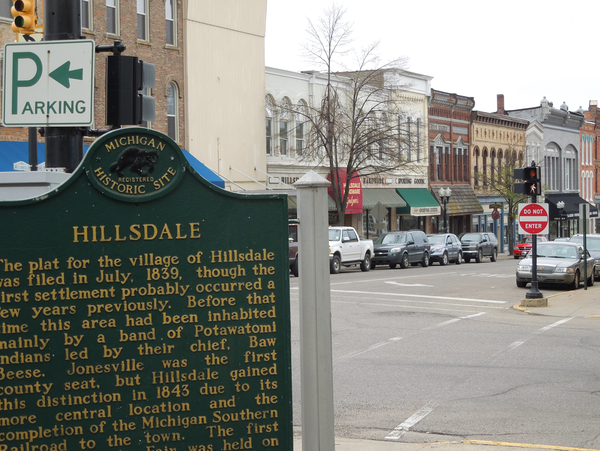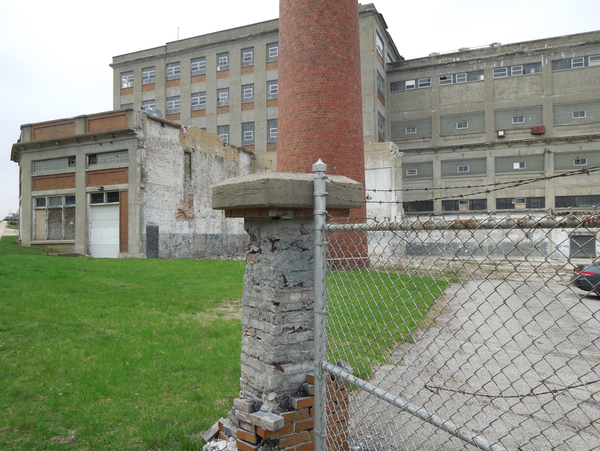In Hillsdale, crumbling streets but support for fixing state’s 'eyesore'

HILLSDALE - The streets are crumbling. City services are pared back. The police force is shrinking. And the budget situation is going to get even worse in the next few years.
The state isn’t offering financial aid to Hillsdale or hundreds of other cash-strapped Michigan municipalities struggling to balance their budgets. No one would blame residents if they resented efforts to help Detroit while their own city was suffering. But even in this Republican stronghold, famous as the home of a college that espouses limited government, residents who spoke with Bridge feel the state needs to help its biggest city.
“No one wants an eyesore as our largest community,” said resident Mary Wolfram.
A statewide poll of 600 Michigan voters commissioned by the Detroit Journalism Cooperative found majority support for a plan to offer $350 million to Detroit to reduce pension debt owed retired city workers and help Detroit avoid having to sell museum artwork as part of a proposed bankruptcy settlement.
Typical of that support is Hillsdale, a community that shares some of the problems, but none of the headlines, of Detroit.
“People know about Detroit,” said Gary Wolfram, husband of Mary Wolfram and a Hillsdale College professor. “But they’re not going to have an opinion of Hillsdale or Moscow or Menominee. People don’t know what’s happening in small towns.”
‘Detroit’s not alone’
Gary Wolfram grips the steering wheel of his Ford Fusion as it rattles along a street he characterizes as “one of our better roads.” Gary is a professor of economics and public policy at Hillsdale College. He and his wife, Mary, work with the city government on economic development. They know the numbers behind Hillsdale’s economic slide, and a short drive around this community near the Indiana and Ohio borders reveals the impact.
The streets are deteriorating. A large, long-closed flour mill sits crumbling just a few blocks from downtown.
Bonnie Tew, the finance director for the city, points to a thick pile of charts showing declines in property taxes and revenue sharing. Unlike Detroit, the city has avoided going into debt, but it’s not been easy.
“Detroit isn’t the only one with problems” Tew said. “The city isn’t in bad financial shape, but we’ve lost our industry. Our property tax revenues have plummeted. When we used to produce $150,000 per mill, now we get $130,000 per mill.”
The city government had 84 employees a decade ago; in the 2014-15 budget year, there will be 68 – a decline that wreaks havoc in a community where the laid off are likely to be Sunday school teachers or youth soccer coaches.
At a heated City Council meeting last week, residents complained about a proposal to cut a full-time police officer position, the third position to be eliminated in the past decade in a department of 14.
Recounting the meeting, Tew shakes her head. “Where are you going to come up with the $50,000 for that officer?” she asked.
Cutting until it hurts
Hillsdale has rising expenses and falling revenue. The top seven employers in the city are all tax-exempt. Property tax revenues dropped with the value of the city’s aging homes. The median household income was $31,535 in 2011, more than 30 percent below the state average.
To keep its municipal pension fund financially strong, the city stopped repairing streets. “Gary and I moved here in 1989,” Mary Wolfram said. “Most of the local streets have not been repaired in that time. We share a lot of the same problems (as Detroit): aging infrastructure, aging housing stock.”
Hillsdale is doing what it can to pinch pennies. The city stopped sweeping the streets a few years ago. A beach at a nearby lake that used to be operated by the city now is funded through fundraisers by the Hillsdale Rotary Club. The city council has been known to debate where to buy nuts and bolts – the local hardware store or the Wal-Mart down the road, where the city could save a few dollars.
Mary Wolfram wonders if Detroit has been managed as well. Still, “do I begrudge Detroit getting some help? No,” she said. “Whether you like it or not, you take care of people.”
That feeling is reflected by Rep. Kenneth Kurtz, R-White Lake, whose district includes Hillsdale, and may soon take part in a vote on the Detroit aid.
“There’s some commonality there,” Kurtz said. “Detroit has problems, we all read about it in the newspaper,” Kurtz said. “But Hillsdale has infrastructure problems, too. The difference is, Detroit is in the New York Times and Hillsdale doesn’t get the headlines.
“There’s no doubt the state has some responsibility to a degree” to help Detroit, Kurtz said. “The whole confidence of the state is at stake. One of the big questions is, where does this end?”
Losing a lifestyle
Nobody expects a bailout anytime soon for Hillsdale. There’s no headline-grabbing bankruptcy here, no one threatening to sell art, no retirees worried about losing their pensions. Instead, you have crumbling streets that no one knows about outside the city limits.
Still, Detroit needs support, Kurtz said. Neighbors help neighbors.
Gary Wolfram hopes that it’s Hillsdale’s turn for support soon. Otherwise, “you’re going to lose a lifestyle,” he said. “Places like Hillsdale are going to become ghost towns.”
See what new members are saying about why they donated to Bridge Michigan:
- “In order for this information to be accurate and unbiased it must be underwritten by its readers, not by special interests.” - Larry S.
- “Not many other media sources report on the topics Bridge does.” - Susan B.
- “Your journalism is outstanding and rare these days.” - Mark S.
If you want to ensure the future of nonpartisan, nonprofit Michigan journalism, please become a member today. You, too, will be asked why you donated and maybe we'll feature your quote next time!


 Hillsdale may not be bankrupt like Detroit, but it has cut back on services and laid off employees, with decreased property tax and revenue sharing blamed for the budget cuts. (Bridge photo by Ron French)
Hillsdale may not be bankrupt like Detroit, but it has cut back on services and laid off employees, with decreased property tax and revenue sharing blamed for the budget cuts. (Bridge photo by Ron French) An abandoned flour mill is Hillsdale’s version of the Detroit’s Michigan Central Station, an eyesore looming near downtown. The mill closed about a decade ago. (Bridge photo by Ron French)
An abandoned flour mill is Hillsdale’s version of the Detroit’s Michigan Central Station, an eyesore looming near downtown. The mill closed about a decade ago. (Bridge photo by Ron French)